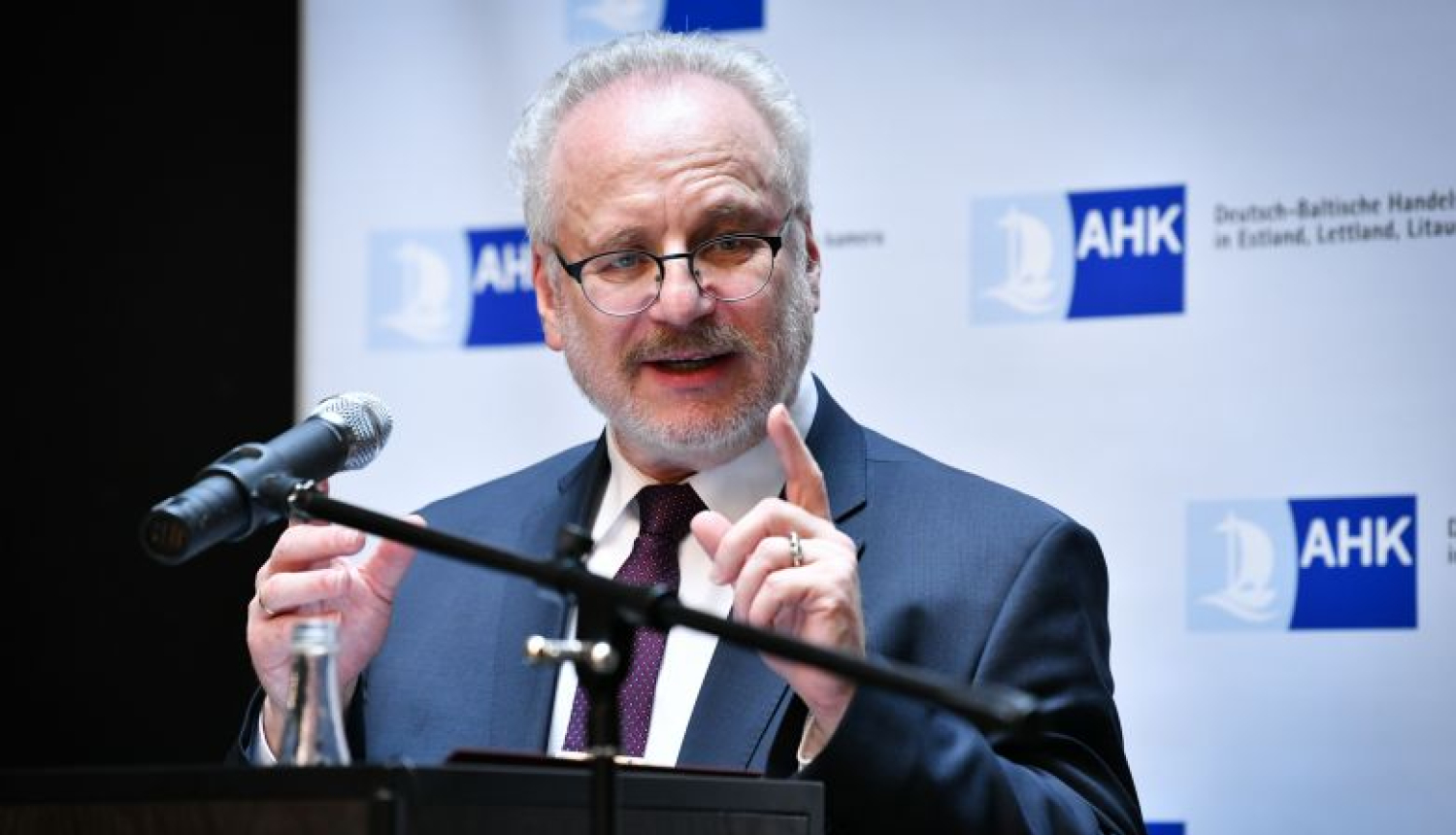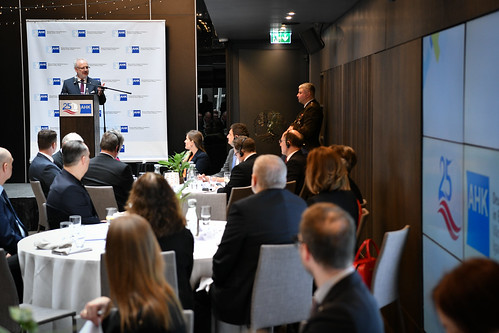Good afternoon!
I am absolutely delighted and pleased to have been invited here by the German-Baltic Chamber of Commerce in Estonia, Latvia and Lithuania (AHK). Thank you! We really appreciate all the work you have done over the past quarter of a century.
As you know, Latvia is a parliamentary republic and Latvian president has mandate and responsibilities similar to a German Federal president. All specific matters are dealt with by the government and parliament, but president has certain influence over their work and policies and can steer them towards what is in president’s opinion best for the whole country. That is exactly what I have been trying to do since becoming a president seven months ago. That is why I am particularly keen to learn what you think are the key issues that affect the Latvian business environment and, of course, trade relations between Germany and Latvia. I am also looking forward to your views on main priorities for Europe that Germany and Latvia have to work on together.
I have already outlined my vision of Latvian politics and economy in numerous speeches to the parliament and interviews that I had given. I have spoken about the importance of positioning Latvia as, and Latvia being aware that we are an integral part of the Western world and Western Europe. We should no longer think as we did 25 years ago when AHK was founded, we should no longer consider ourselves a bridge between East and West. We no longer need to be a bridge because of direct ties. Therefore, it is important to realise that we belong to the West. As a political scientist who has had special interest in the German history, I would say that this is similar to what the Federal Chancellor Adenauer claimed in the 1950’s when he insisted that Germany will never be neutral, it will always belong to the West. It was part of an on-going political debate between the two largest German political parties that had different opinions. Eventually, however, it was broadly recognised that Germany is not a special country standing somewhere in the middle. It should be considered an integral part of the West. I believe that Latvia also had to make this crucial choice at one point, and we came to the same conclusion as Germany in the 1950’s.
Latvia is active in the European Union (EU) and we are involved in debating and deciding all matters. Like any other EU member state, we have our own national position. Our position has two dimensions or focuses on two goals. We try to make sure that these collective decisions are good for Latvia given the unique national context, and we also try to ensure that decisions collectively adopted by the EU benefit the whole Union. I believe that is the best way forward compared to, let us say, egomaniacal approach that ends in nothing. Compared to bigger countries, smaller countries may struggle with that. Nevertheless, big countries may eventually also start stalling if they fail to respect and promote, let us say, shared vision and common interests. That is why our foreign policy and European policy is based on multilateralism. In this regard, we are on the same wavelength as the German government which has officially declared that international relations should be centred around the principles of multilateralism. Precisely a week ago I was at the Munich Security Conference where we discussed multilateralism. It was one of the key topics because there are some countries in the world that have begun sliding away from multilateralism and that, of course, has created problems globally. That is why Europe must, let us say, build on its past track record.
Previous speaker already mentioned that European Union accounts for 33% of the global trade. That is what makes us powerful. Economically we are a one big country. However, we sometimes hesitate to turn this economic power into political gains. But, if others use it without any remorse and we hesitate, it is us, Europeans, who will lose out in the end. That is why we think Europe should show that it is a power to be reckoned with. One of, let us say, interesting and indirect, and at the same time powerful, ways to show it or manifestations of it, and I have seen myself a number of times throughout my 15-year career as an EU judge how it works, is the standard setting power. Europe is the champion of standard setting. There is this specific term in political science, the standard setting power, and Europe is the global superpower in that sense. Europe sets global economic standards for various products and, for example, leads the way with its General Data Protection Regulation (GDPR). This was a much-contested idea in America, but eventually different US states began gradual integration of GDPR standards. Standards that were initially set by Europe, by us, here. I believe that this is one of the great assets of Europe’s ‘soft power’ because it is extremely efficient.
Why am I mentioning this? Because that is very important for the economy, for Europe’s global economic influence. As regards to Latvia, our focus, of course, is on stronger Europe on the whole, and Latvia is ready to contribute. As a rather small country, it is easier for Latvia to manage and implement changes more efficiently and quickly than bigger countries for whom that would require more resources. And Latvia has already demonstrated that with the right commitment and focus it can make major improvements a lot quicker. It has already been mentioned that we managed to, let us say, restructure our financial sector very quickly. Now we must find ways to implement these rather unique standards for the EU, and probably the rest of the world because Europe has the highest standards in this area as far as I know, across Europe. This is crucial because such high financial sector standards must work not only in Latvia but also other European countries. That is why one of the short-term goals of the EU should be the implementation of these standards across the Union.
On the other hand, we see, and you, dear colleagues, and your businesses have also felt it firsthand, such high standards recently adopted by Latvia may lead to certain challenges, for example, may make opening of bank account or money transfers more complicated. Latvian government, of course, is aware of these challenges and responsible authorities have been instructed to prepare guidelines as soon as possible to give banks an ‘operations manual’ for these new standards. That should help banks avoid the ‘trap’ of excessive due diligence and precaution which, of course, may also be detrimental. This is what the government is now planning to do, let us say, to ensure that these guidelines make doing business and cooperation with banks easier.
We see that Latvia has excelled and continues to make further leaps in some areas. ICT is one of such areas. Our pro-startup legislation has led to a major increase in the number of registered startups. Like everywhere else, most of these startups, of course, disappear within a year, but those that survive are there to stay, they have good ideas and management. Latvia also tries to integrate new technologies in other areas as well. For example, one of the startups has developed a new automobile DC energy supply system for the new Daimler factory in Germany. It will generate 10-15% petrol savings. 10-15% reduction is, of course, huge from the perspective of the greening of the economy and will boost the competitiveness of Daimler. There are also exciting developments in drone, computing and other technologies.
Those of you who are following the public debate in Latvia know that higher education reform is a hotly-debated topic. Government is committed to making higher education more efficient and better. Although the quality of education is already high, our ambition is to make it even better. I am looking forward to seeing Latvia make major progress in higher education in the coming years. Our education system is already quite competitive at the European level, which is reflected in a rather large number of German students. Around 1,000 students from Germany have chosen Latvia and work in Germany or elsewhere in Europe once they graduate. Most of them study medicine. Medicine is one of the areas in which Latvia is also expected to make great progress.
In conclusion, let me say that we have wonderful and strong Hanseatic ties and traditions. Our trade ties with Germany date back to 1150 and these ties have never been lost. These ties have only grown bigger and bigger. You are a part of these growing bilateral trade and economic relations, and I thank you for that, indeed. Moreover, apart from bilateral relations, German investors have played a particularly significant role in our economic growth. I am happy about the huge investment projects that will come to Latvia soon. German products, craftsmanship and professionalism are still regarded as some of the best. Figuratively speaking, this good reputation and fame can be translated into monetary terms.
Thank you for what you are doing here in Latvia! I wish you all the best and a spectacular 25th anniversary celebration. Thank you!





